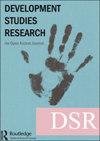援助助长了腐败吗?来自一项跨国分析的新证据
Q2 Social Sciences
引用次数: 3
摘要
摘要本研究采用两步最小二乘法估计了外国援助对腐败的影响。我们使用工具变量来解决内生性问题,这些变量反映了捐助国和受援国之间的地理和文化接近性。根据2005-2017年期间122个国家的小组框架,我们发现外国援助对腐败没有重大影响。即使在检查了不同的样本、估计技术和援助类型后,我们的基准结果仍然微不足道。本文章由计算机程序翻译,如有差异,请以英文原文为准。
Does aid fuel corruption? New evidence from a cross-country analysis
ABSTRACT This study estimates the effect of foreign aid on corruption using a Two-Step Least Squares method. We address endogeneity using instrumental variables that capture geographical and cultural proximities between donor and recipient countries. Based on a panel framework of 122 countries for the period 2005–2017, we find no significant impact of foreign aid on corruption. Our benchmark results remain insignificant even after checking with respect to different samples, estimation techniques, and the types of aid.
求助全文
通过发布文献求助,成功后即可免费获取论文全文。
去求助
来源期刊

Development Studies Research
Social Sciences-Development
CiteScore
3.20
自引率
0.00%
发文量
20
审稿时长
12 weeks
期刊介绍:
Development Studies Research ( DSR) is a Routledge journal dedicated to furthering debates in development studies. The journal provides a valuable platform for academics and practitioners to present their research on development issues to as broad an audience as possible. All DSR papers are published Open Access. This ensures that anyone, anywhere can engage with the valuable work being carried out by the myriad of academics and practitioners engaged in development research. The readership of DSR demonstrates that our goal of reaching as broad an audience as possible is being achieved. Papers are accessed by over 140 countries, some reaching over 9,000 downloads. The importance of the journal to impact is thus critical and the significance of OA to development researchers, exponential. Since its 2014 launch, the journal has examined numerous development issues from across the globe, including indigenous struggles, aid effectiveness, small-scale farming for poverty reduction, sustainable entrepreneurship, agricultural development, climate risk and the ‘resource curse’. Every paper published in DSR is an emblem of scientific rigour, having been reviewed first by members of an esteemed Editorial Board, and then by expert academics in a rigorous review process. Every paper, from the one examining a post-Millennium Development Goals environment by one of its architects (see Vandermortele 2014), to ones using established academic theory to understand development-imposed change (see Heeks and Stanforth 2015), and the more policy-oriented papers that contribute valuable recommendations to policy-makers and practitioners (see DSR Editor’s Choice: Policy), reaches a multidisciplinary audience.
 求助内容:
求助内容: 应助结果提醒方式:
应助结果提醒方式:


